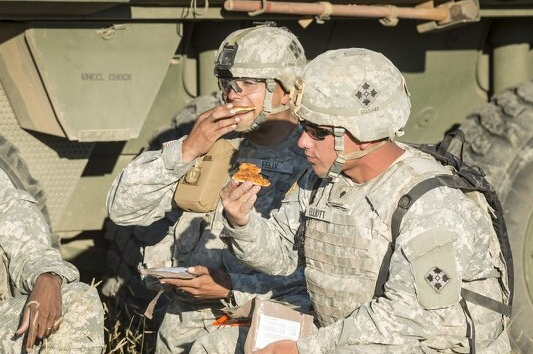The military could soon be mandating a ketogenic (keto) diet, according to the Military Times.
This may mean foregoing beer and pizza in favor of salads for many service members, especially Navy SEALs.
While the new diet could eventually be put into effect for all branches of the government, SEALS and other underwater specialists could be the first groups targeted for the change. Lisa Sanders, the director of science and technology at U.S. Special Operations Command, recently presented a study that recommends the keto diet, which works to deprive the body of glucose and forces it to burn stored fat.
In her presentation, she said:
“One of the effects of truly being in ketosis is that it changes the way your body handles oxygen deprivation, so you can actually stay underwater at depths for longer periods of time and not go into oxygen seizures.”
This discussion comes at a time of growing concern about obesity in the military. But there has been some pushback, including those who wonder whether the military has the legal and ethical authority to control its service-members’ diet 24 hours a day.
And while service-members are familiar with physical testing, it is possible that they could be soon be in store for daily ketosis testing. The plan is strict and service members may be tempted to cheat after hours and on weekends. Blood and urine tests can be used to assure that bodies are in a constant state of ketosis. Produce choices and meat quality of military dining facilities will come further into focus as a result of the changes, and the high carb and sugar content of MRE’s would also be a thing of the past.
Kinesiologist Jeff Volek, a professor at Ohio State University’s Department of Human Sciences said:
“You can carry even more calories because fats weigh less, which is an advantage.”
In the future, this could result in dining facilities serving Ezekiel bread, zucchini “pasta spirals” to replace pasta, mashed cauliflower as a substitute for potatoes and rice, and avocado-heavy salads.
And the economics of the potential change have also been called into question. Military budgets, salaries and allowances would have to be altered – and maybe rise across the board – to meet the economic demands of a diet that requires higher quantities of vegetables, fats and proteins.
Volek disagrees: “The ketogenic diet is high in fat, which is less costly. The majority of the diet is based on fat, and fat calories can be very cheap. Meats, eggs, fish, chicken, cheese, butter, seeds, nuts, and non-starchy vegetables are the basis of the diet. Fat is the key or primary nutrient.”
via ZeroHedge News https://ift.tt/2FOuDUG Tyler Durden

